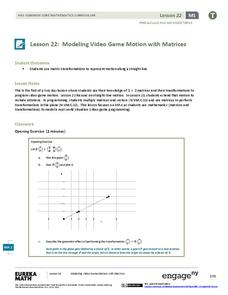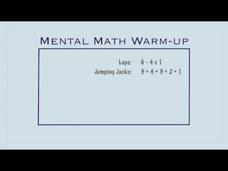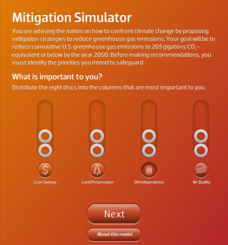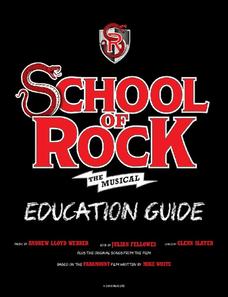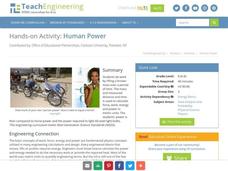Balanced Assessment
Time Line
Use a graph to tell a story! Given a graph, young scientists create a story to match. They must provide their own axes labels and description of the scenario. The graph has increasing, decreasing, and constant sections.
EngageNY
Modeling Video Game Motion with Matrices 1
Video game characters move straight with matrices. The first day of a two-day lesson plan introduces the class to linear transformations that produce straight line motion. The 23rd part in a 32-part series has pupils determine the...
Noyce Foundation
Building Blocks
Building blocks have more uses than simply entertaining children. Young mathematicians calculate the volume of a given cube, and then calculate the volume and surface area of a prism formed from multiple cubes.
EngageNY
Addition and Subtraction Formulas 2
Knowing the addition formulas allows for the calculations of double and half formulas. The fourth installment of 16 has the class use the addition formula to develop the double angle trigonometric formulas. Using the double formula,...
Davis School District
Computer Parts
What is inside a computer? Give your budding computer scientists a worksheet that has them label parts of a computer. They use a link included on the sheet to label basic input/output systems, video cards, drives, case fan, and more....
EngageNY
Linear and Nonlinear Expressions in x
Linear or not linear — that is the question. The lesson plan has class members translate descriptions into algebraic expressions. They take the written expressions and determine whether they are linear or nonlinear based upon the...
Balanced Assessment
Ford and Ferrari
Which is faster, a Ford or a Ferrari? The short assessment has pupils analyze graphs to determine the rates of change between the two. Individuals interpret the rates of change within the context of speeds of the cars and develop a map...
Teach Engineering
Aerogels in Action
Model an oil spill cleanup. An engaging engineering lesson has groups using aerogels to simulate an oil spill cleanup (vegetable oil in water). Along the way, they learn about nanotechnology and hydrophilia/hydrophobia.
EngageNY
Percent
Extend percent understandings to include percents less than one and greater than 100. A great lesson has pupils build upon their knowledge of percents from sixth grade. They convert between fractions, decimals, and percents that are less...
Teach Engineering
Adapatations for Bird Flight - Inspiration for Aeronautical Engineering
It's a bird, it's a ... device made to mimic birds. The eighth installment of a nine-part module has pupils read various articles to learn about bird flight. They consider the implications for aeronautical engineering.
Teach Engineering
Body Full of Crystals
Your body has lots of crystals, just not any gemstones. The first installment of a three-part unit provides a PowerPoint presentation on crystallization occurring in the human body and about crystallization in general. The resource gives...
PhysEdGames
Mental Math Warm-Up
Use a simple warm-up that has pupils solving math equations to determine the number of reps for a certain exercise. Learners use mental math to solve basic equations. Next, they must do the same number reps of whatever exercise...
Columbus City Schools
The Mystery of Earth’s History
Every living creature can leave a fossil record, yet most fossils belong to extinct organisms rather than ones currently living. Scholars learn about dating rock layers, fossils, and the environment of the past. Pupils understand that...
EngageNY
Positive and Negative Numbers on the Number Line—Opposite Direction and Value
Make your own number line ... using a compass. The first installment of a 21-part series has scholars investigate positive and negative integers on a number line by using a compass to construct points that are the same distance from zero...
California Education Partners
T Shirts
Which deal is best? Learners determine which of two companies has the best deal for a particular number of shirts. They begin by creating a table and equations containing each company's pricing structure....
National Academy of Sciences
Mitigation Simulator
The United States has more per capita emissions than any other country in the world. An eye-opening simulation encourages users to explore environmental goals and factors that affect climate change by balancing different priorities....
Fluence Learning
Writing About Literature: What Is Happiness?
Jack London's heart for adventure has come to define the spirit of America and its frontier. Selected passages from the foreword The Cruise of the Snark take eighth graders through London's construction and voyage of his ship before...
Fluence Learning
Writing About Informational Text: Beyond the Beyond—Galaxies
Everyone has a different point of view, even when it comes to the enormity of the universe. Two separate text passages explain the scope of a galaxy, prompting young readers to write an essay about each author's argument and how the...
NOAA
Ocean Currents
Go with the flow! The eighth installment in a 13-part series has earth science students dive in to the world's system of ocean currents. The interactive illustrates the different types and depths of currents, how wind and gravity...
Emergency & Community Health Outreach
Breast Cancer: Prevent, Detect, Treat
Odds are, most of the members of your class know someone who has been affected by breast cancer. Teach them more about prevention through healthy lifestyles, detection with self-testing and mammograms, and the most effective treatments...
Concord Consortium
Energy of a Spring
Spring has sprung! Young physicists explore the properties of springs with a simple simulator. Users control the initial position of the spring, then observe the potential, kinetic, and thermal energies in the system.
PBS
Hidden Alarm
It's time! The fourth lesson in a five-part series has teams of scholars build a circuit for an alarm. A switch lets them turn the alarm on and off and allows them to hide the alarm—just as long as they don't hide it in the classroom!
iTheatrics and Broadway
School of Rock the Musical: Education Guide
That old fashioned rock and roll comes alive as theatre arts students prepare to attend a live performance of the musical School of Rock. Packed with both pre- and post-production materials, the guide has it all. Rock on!
Teach Engineering
Human Power
How many humans does it take to power a light bulb? The 10th part of a 25-lesson Energy Systems and Solutions unit has learners conduct an experiment to calculate power. They then use the results to determine how many classmates they...
Other popular searches
- 1st Grade Grammar Has/have
- Helping Verbs Have Has
- I Have Who Has
- Have and Has
- I Have Who Has Game
- Using Has and Have
- Have To/has To
- Verbs Has and Have
- Have Got Has Got
- Have Has Had
- Language Has and Have
- Have Got /Has Got

